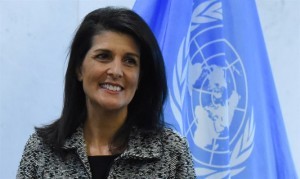Washington has decided to walk out of the UN Human Rights Council, accusing the body of hypocrisy. The US has long cited concerns about the body’s “anti-Israel bias.”
Secretary of State Mike Pompeo and US envoy to the UN Nikki Haley announced the decision at a press conference Tuesday afternoon.
“The US is officially withdrawing from the UN Human Rights Council,” Haley said, calling it a “hypocritical and self-serving organization that makes a mockery of human rights.”
“American participation is the last shred of credibility the council has,” Haley argued. “That is precisely why we must leave.”
“The Human Rights Council is a poor defender of human rights. Worse than that, it has become an exercise in shameless hypocrisy,” Pompeo said, blasting the council for passing more resolutions against Israel than against the rest of the world combined.
Israeli PM Benjamin Netanyahu thanked the US for the “courageous decision” to leave the body, which he called a “biased, hostile, anti-Israel organization that has betrayed its mission of protecting human rights.”
“The US decision to leave this prejudiced body is an unequivocal statement that enough is enough,” Netanyahu said. “Israel welcomes the American announcement.”
Moscow has denounced the decision, accusing the US of hypocrisy.
“Apparently, the US wanted to turn the council into a complacent mechanism that would promote its interests and punish those who disagree,” the Russian mission at the UN said, adding that the US’ attempts to justify its walkout by the council’s politicization are plain cynical.
The council is “the key international platform” for cooperation in the sphere of human rights, and is designed to cater to the interests of all the member-states, “not to that of one country or a group of countries,” the mission said. “Unfortunately, our colleagues in Washington don’t understand this or don’t want to accept this.”
This is the first time a member of the council would leave the body voluntarily. The US was halfway through its three-year term on the 47-member panel.
On Monday, the UN High Commissioner for Human Rights Zeid Ra’ad al-Hussein criticized Washington over the “unconscionable” policy of separating children of immigrants who cross the border illegally and holding them in detention centers.
“I call on the United States to immediately end the practice of forcible separation of these children,” al-Hussein said.
While the timing of the US exit from the UN body coincides with this criticism, Washington’s objections to the Human Rights Council over the years have mostly been in regard to Israel. Ambassador Haley has accused the council of a “relentless, pathological campaign” against Israel, and said the US would leave unless the body gets rid of its “chronic anti-Israel bias.”
Shortly after its establishment in 2006, the council voted to make a review of alleged human rights abuses by Israel a permanent feature of every session, known as Agenda Item 7. Likewise, the body’s special rapporteur on the Israeli-Palestinian conflict is the only expert whose mandate is not time-limited.
The George W. Bush administration boycotted the council at its inception, but the Obama administration decided to “re-engage” with the body in 2009. Even so, in 2011 Secretary of State Hillary Clinton accused the council of “structural bias” against Israel.
Domestically, some critics of President Donald Trump are citing the move as proof his administration does not believe in human rights and rule of law.
The decision “sends a clear message that the Trump administration does not intend to lead the world when it comes to human rights,” said Senator Chris Coons (D-Delaware), who serves on the Foreign Relations Committee.
Leaving the council is unlikely any immediate practical implications for US diplomacy, aside from allowing the UN body to continue condemnations of Israel without much in the way of opposition. Last month, when the council voted to investigate the killing of over 100 Palestinians in protests along the Israel-Gaza border and accused Israel of excessive force, only the US and Australia voted against.
Source: rt
Ask me anything
Explore related questions





